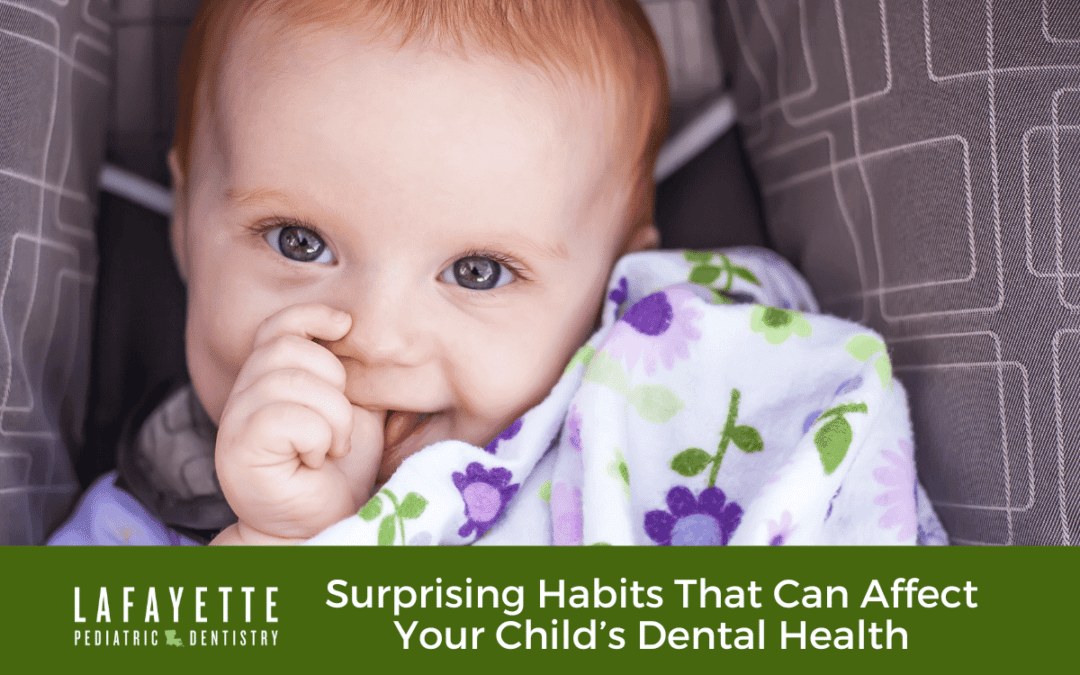Kids pick up all kinds of habits, and while some seem totally harmless, they can actually affect their oral health in the long run.
Thumb-sucking, ice chewing, gum picking, and teeth grinding are just a few behaviors that can lead to issues like misalignment, enamel damage, and even sleep-related problems.
Some of these habits fade on their own, but others might need a little nudge to stop. Below, we’ll go over some of the most common habits, what they can do to your child’s teeth, and how to break them before they turn into bigger problems.
Thumb or Finger-Sucking
Thumb or finger-sucking is a natural reflex that provides comfort, which is why many babies and young children do it. While it’s normal in infancy, it’s important to prevent it from becoming a long-term habit. 
Prolonged sucking can affect jaw and teeth development, causing issues like crossbites and open bites. This can make chewing and speaking harder and may require orthodontic treatment later on.
The longer the habit continues, the harder it can be to correct these issues.
The best way to help them stop is through patience and encouragement. Instead of scolding, offer gentle reminders and praise when they avoid it. You can also try using small rewards or incentives (that aren’t candy!) to keep them motivated.
If you’re looking for more detailed tips, you can check out our previous blog here.
Ice Chewing
Some kids develop a habit of chewing on ice, especially on hot days. It might seem like a harmless and refreshing way to cool down, but it can actually be rough on their teeth.
Constantly crunching on ice can create tiny cracks in the enamel, which weakens the teeth over time. These cracks might not be noticeable at first, but they can grow and eventually lead to fractures, especially if your child has fillings.
Worn-down enamel can also make teeth more sensitive to hot and cold foods and drinks, which can be uncomfortable and even painful.
One way parents can help stop this habit is by offering alternatives like crunchy fruits and veggies, nuts, or sugar-free gum instead of ice to satisfy the urge to chew. You can also find other ways to help your child kick the chewing habit in our previous blog here.
Gum Picking
Just like thumb-sucking and teeth grinding, gum-picking is another habit that can affect your child’s oral health. It’s a nervous behavior that some kids develop without even realizing it. They might use their fingers or even objects like straws and toys to pick at their gums.
This habit can actually lead to gum recession. When the gums recede, they expose the tooth roots, which makes the teeth more sensitive to hot or cold foods and drinks.
In addition, receding gums can create spaces where bacteria can accumulate and increase the risk of tooth decay.
Parents often don’t notice their child doing this until the gums have already started to recede, or until the dentist points it out.
Since this habit can come from different sources, such as stress or anxiety, it’s important to talk with your child to understand the underlying cause and address it with a professional if needed.
Using Teeth as Tools
Kids can be incredibly creative, and sometimes that includes using their teeth for things they shouldn’t, like tearing open snack bags or trying to cut things. Using teeth as tools can lead to chips, cracks, or even serious dental emergencies.
Our teeth aren’t designed for that kind of pressure, and over time, this habit can weaken them and make them more vulnerable to damage.
If your child does this, encourage them to use scissors or ask for help instead. Teaching them to rely on the right tools can help prevent unexpected dental problems. It’s a simple habit to correct but an important one to watch out for.
Teeth Grinding
Teeth grinding, as the name suggests, is when a child grinds their teeth or clenches their jaw, usually while sleeping.
Since it happens unconsciously, they may not even realize they’re doing it. It’s actually quite common in kids, especially those under 11. Most of the time, it starts to slow down between ages 6 and 9 and stops completely between ages 9 and 12.
While occasional grinding isn’t usually a cause for concern, if it continues past age 12, it’s best to consult a pediatric dentist to find a solution and prevent long-term damage. Your dentist may recommend using a mouthguard.
But for kids with special needs who may have difficulty wearing one, alternative approaches such as behavioral modification techniques might be more effective.
Mouth Breathing
Many parents don’t realize their child breathes through their mouth, and unfortunately, it can affect more than just their oral health. Mouth breathing is often a sign of sleep-disordered breathing, which can impact overall health and development. 
When a child breathes this way during sleep, the jaws remain open in an elongated position, which can cause them to narrow as they grow.
This can restrict proper nasal airflow, contribute to frequent congestion, and prevent the tongue from resting in its ideal position. Instead, the tongue falls backward, partially blocking the airway.
Over time, this can reduce REM sleep and cause excessive daytime fatigue. If left unaddressed, chronic mouth breathing can affect long-term growth and development and may lead to issues such as poor school performance and even anxiety or depression.
Parents need to be proactive in spotting this habit early. If your child regularly wakes up feeling unrested, has trouble concentrating, and frequently has their mouth open, it may be time to consult a pediatrician.
So those are some of the habits your child might unknowingly pick up that can affect their dental health and overall well-being. It’s important to correct them early before they cause serious problems.
Our pediatric dental specialists at Lafayette Pediatric Dentistry are committed to providing your child with the best care possible.
We offer a wide range of preventative dental services, as well as specialized treatments such as tongue and lip tie releases, sedation, airway evaluations, speech and feeding assessments, and more.
If you have concerns about your child’s dental health or want to make sure their teeth and oral development stay on the right track, we’re here to help. Contact us with any questions or to schedule an appointment!
